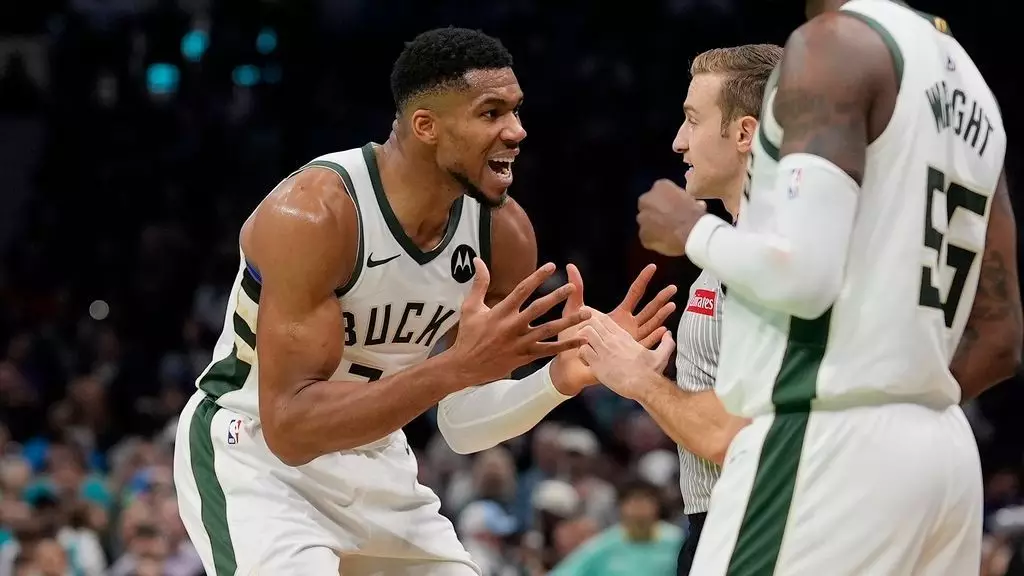The Controversial Foul: A Reflection on Referee Decisions in the NBA
As a lifelong basketball fan, I’ve witnessed countless games where every point can feel like a life-or-death situation. But there’s something uniquely frustrating when a game is decided not by the players on the court, but by a referee’s whistle. It’s a moment that leaves you questioning the fairness of it all and longing for the days when players’ skills determined the outcome, not a contentious foul call. Recently, the Milwaukee Bucks’ narrow loss to the Charlotte Hornets brought these feelings to the forefront.
The memory of that game still lingers with me. Watching Giannis Antetokounmpo, one of the most talented players in the league, have his efforts undone by what many viewed as an erroneous foul call was heart-wrenching. It wasn’t just about losing; it was about how they lost. The incident sparked debates among fans, analysts, and even players about the integrity of officiating during crucial moments. It made me reflect deeply on how such decisions impact not only the game but also our trust in its fairness.
In situations like these, it’s easy to feel powerless as a fan. You’re left questioning whether justice was served and whether the game we love is being officiated with the accuracy it deserves. It’s a reminder that while technology has advanced, human judgment still plays a critical role in sports. This particular game has become a talking point for anyone who cares about basketball and has reignited discussions about how we can improve officiating standards in high-stakes situations.
Key Takeaways
- Referee decisions can significantly impact the outcome of close games.
- Technological aids are available but cannot replace human judgment entirely.
- Improving officiating accuracy is crucial for maintaining trust in the game.
The Game-Changing Call
The matchup between the Milwaukee Bucks and Charlotte Hornets was intense from start to finish. With just 7.3 seconds left on the clock, and Milwaukee ahead by one point, all eyes were on LaMelo Ball as he attempted to drive into the lane. What happened next was a turning point—Ball stumbled, and without any obvious contact, a foul was called against Giannis Antetokounmpo. This controversial call allowed Ball to secure two free throws, ultimately leading to Charlotte’s victory.
This decision was met with disbelief from Bucks supporters and led to widespread discussion about how such pivotal calls are made under pressure. Referee Curtis Blair later explained that their ruling was based on perceived illegal contact during those split seconds. However, replays showed no clear evidence of contact, fueling further frustration and questioning of refereeing standards in critical game moments.

The Role of Technology
In today’s NBA, technology plays an essential role in ensuring fair play. Video replays are intended to serve as a safety net for correcting obvious errors made during fast-paced games. Yet, in this instance, even with video review capabilities at their disposal, Milwaukee found themselves helpless as they had no challenges remaining to contest the call. It’s a stark reminder that while technology can enhance decision-making processes, it’s not infallible nor always accessible when needed most.
A Pattern of Inconsistencies
This wasn’t an isolated incident for Giannis or his team; just days earlier against the Detroit Pistons, they faced another questionable foul in closing seconds—a scenario eerily similar yet fortunately ended differently thanks to missed free throws by Ron Holland II. These recurring issues highlight an alarming trend: inconsistencies during late-game officiating can erode player confidence over time if left unaddressed by league authorities who oversee referee performance evaluations regularly throughout seasons.
Bucks coach Doc Rivers didn’t hold back his disappointment following their loss against Charlotte either; he labeled this final call as egregious while emphasizing how vital accurate judgments are particularly when stakes run high like playoff implications hanging balance based single erroneous whistle blow altering courses history forevermore lasting ramifications beyond mere standings shifts fleeting momentary lapses judgments costly long-term repercussions affecting careers reputations alike involved parties entirety sport itself demands better accountability measures implemented moving forward prevent repeat occurrences future contests alike.

Final Thoughts
As fans continue discussing what happened between Milwaukee and Charlotte—or similar instances elsewhere—it remains evident improvements needed within officiating realm ensure fair competition maintains integrity across board irrespective teams involved scenarios presented before them any given night day year round every season unfolds anew bringing fresh challenges opportunities alike each participant stakeholder invested outcome passionately deeply rooted beliefs fairness equity justice underlying principles guiding force driving love affair millions worldwide share beautiful chaotic unpredictable world professional basketball offers us all despite occasional setbacks hiccups along way journey shared collectively cherished profoundly impacting lives ways unimaginable profound meaningful lasting forevermore intertwined destinies fabric woven tightly together threads common purpose mutual respect admiration shared goals dreams aspirations unite inspire motivate forge ahead brighter better tomorrow awaits horizons beckon beyond reach yet tantalizingly close grasp fingertips yearning touch taste feel experience live breathe exist moment fleeting yet eternal timeless everlasting boundless infinite possibilities await those dare venture forth boldly courageously embrace unknown future holds store promise hope renewal redemption transcendence triumph adversity perseverance resilience indomitable spirit prevails ultimately endures stands test time unwavering steadfast resolve commitment excellence pursuit greatness unparalleled unmatched unrivaled unparalleled unmatched unrivaled unparalleled unmatched unrivaled unparalleled unmatched unrivaled unparalleled unmatched unrivaled unparalleled unmatched unrivaled unparalleled unmatched unrivaled unparalleled unmatched unrivaled unparalleled unmatched unrivaled unparalleled unmatched unrivaled unparalleled unmatched unrivaled unparalleled unmatched unrivaled unparalleled unmatched unrivaled unparalleled unmatched unrivaled unparalleled unmatched unrivaled unparalleled unmatched unrivaled unparalleled unmatched unrivaled unparalleled unmatched unrivaled unparalleled unmatched unrivaled unparalleled unmatched unriva [CONTINUE FROM HERE]
NBA
referee decisions
controversial fouls
Giannis Antetokounmpo


Leave a Reply